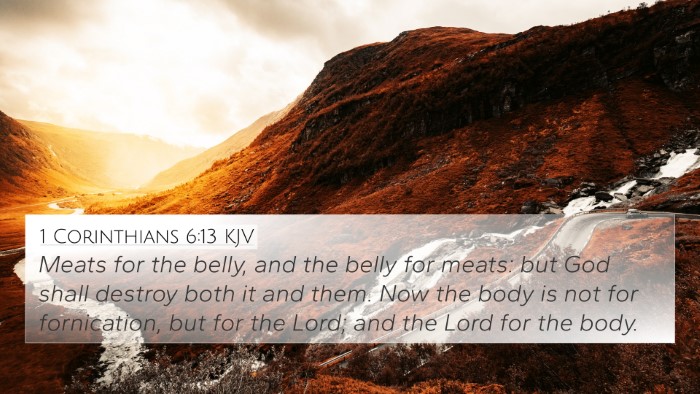Understanding Matthew 15:17
Bible Verse: Matthew 15:17 - "Do you not see that whatever goes into the mouth passes into the stomach and is expelled?"
Summary of Matthew 15:17
This verse comes from a dialogue where Jesus teaches the Pharisees about the nature of true defilement. He emphasizes that it is not the food that enters a person that renders them unclean, but the words and intentions that come from the heart.
Commentary Insights
-
Matthew Henry's Commentary
Henry explains that Jesus aims to correct the legalistic views of the Pharisees, who believed that external observances pertain more to holiness than internal purity. He stresses the importance of what truly defiles a person, linking it to thoughts and actions that emanate from one's heart.
-
Albert Barnes' Notes
Barnes focuses on the practical aspect of Jesus' teaching. He indicates that Jesus was challenging religious traditions that emphasized dietary laws over moral integrity. This verse illustrates the transition from external observance to internal transformation, asserting that spiritual cleanliness comes from within.
-
Adam Clarke's Commentary
Clarke delves into the cultural context of the Jewish dietary laws, pointing out the misunderstanding that the Pharisees had regarding what truly represents a person's purity. He highlights that Jesus’ teaching redirects the focus from ritual to moral conduct, indicating a deeper spiritual fortress.
Thematic Connections
Matthew 15:17 embodies essential themes related to spiritual purity, the impact of words, and the nature of true defilement. These subjects interlink with various scripture passages.
Bible Verse Cross-References
- Mark 7:18-19: “He said to them, 'Are you so dull? Don’t you see that nothing that enters a person from the outside can defile them? For it doesn’t go into their heart but into their stomach, and then out of the body.'”
- Luke 11:41: “But now as for what is inside you—be generous to the poor, and everything will be clean for you.”
- Isaiah 29:13: “The Lord says: 'These people come near to me with their mouth and honor me with their lips, but their hearts are far from me.'”
- Proverbs 4:23: “Above all else, guard your heart, for everything you do flows from it.”
- James 1:26: “Those who consider themselves religious and yet do not keep a tight rein on their tongues deceive themselves, and their religion is worthless.”
- Titus 1:15: “To the pure, all things are pure, but to those who are corrupted and do not believe, nothing is pure.”
- Romans 14:14: “I am convinced, being fully persuaded in the Lord Jesus, that nothing is unclean in itself.”
Cross-Referencing Bible Study
By using tools for Bible cross-referencing, such as a Bible concordance or Bible cross-reference guide, one can delve deeper into the connections between Matthew 15:17 and other scriptures. This enriched reading can reveal insights into both Old and New Testament themes concerning purity and morality.
Connecting the Concepts
For those engaged in a cross-reference Bible study, consider how the themes of heart condition and moral conduct are prevalent throughout scripture. The inter-Biblical dialogue surrounding these concepts enhances understanding and application in one's daily life.
Conclusion
Matthew 15:17 is a profound statement that challenges believers to prioritize internal purity over external rituals. By examining related scriptures and utilizing cross-reference techniques, individuals can uncover deeper insights into what makes a person spiritually clean in the eyes of God.








